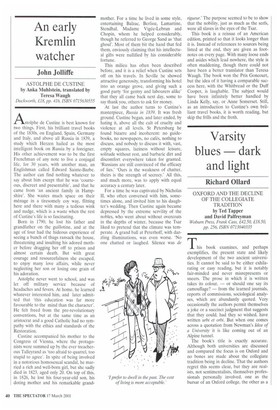An early Kremlin watcher
John Jolliffe
ASTOLPHE DE CUSTINE by Anka Muhlstein, translated by Teresa Waugh Duckworth, £18, pp. 416, ISBN 0715630555 Astolphe de Custine is best known for two things. First, his brilliant travel books of the 1830s, on England, Spain, Germany and Italy, and above all Russia in 1839, a study which Herzen hailed as the most intelligent book on Russia by a foreigner. His other achievement was to be the first Frenchman of any note to live a conjugal life, for 30 years, with another man, an Englishman called Edward Sainte-Barbe. The author can find nothing whatever to say about him except that he was 'courteous, discreet and presentable', and that he came from an ancient family in Hampshire'. She wastes much space on their ménage in a tiresomely coy way, flitting here and there with many a tedious wink and nudge. which is a waste when the rest of Custine's life is so fascinating.
Born in 1790, he lost his father and grandfather on the guillotine, and at the age of four had the hideous experience of seeing a bunch of thugs ransack the house, threatening and insulting his adored mother before dragging her off to prison and almost certain death. But with great courage and resourcefulness she escaped, to enjoy many love affairs, while never neglecting her son or losing one grain of his adoration.
Astolphe never went to school, and was let off military service because of headaches and fevers. At home, he learned whatever interested him, and later admitted that this education was far more favourable to the mind than the character'. He felt freed from the pre-revolutionary conventions, but at the same time as an aristocrat and a good Catholic had no sympathy with the ethics and standards of the Restoration.
Custine accompanied his mother to the Congress of Vienna, where the protagonists were summed up by the ever treacherous Talleyrand as 'too afraid to quarrel, too stupid to agree'. In spite of being involved in a notorious homosexual scandal, he married a rich and well-born girl, but she sadly died in 1823, aged only 20. On top of this, in 1826, he lost his four-year-old son, his doting mother and his remarkable grand
mother. For a time he lived in some style, entertaining Balzac, Berlioz, Lamartine, Stendhal, Madame Vigee-Lebrun and Chopin, whom he helped considerably, though he referred to George Sand as 'that ghoul'. Most of them bit the hand that fed them, enviously claiming that his intellectual gifts were nullified by his considerable fortune.
This milieu has often been described before, and it is a relief when Custine sets off on his travels. In Seville he showed attractive generosity, transforming his hotel into an orange grove, and giving such a good party 'for gentry and labourers alike' that they all came back next day, some to say thank you, others to ask for money.
At last the author turns to Custine's masterpiece, Russia in 1839. It was fresh ground. Custine began, and later ended, by hating it, above all the cult of cruelty and violence at all levels. St Petersburg he found bizarre and incoherent: no guidebooks, no newspapers, no cafés, nothing to discuss, and nobody to discuss it with, vast, empty squares, laziness without leisure, solitude without rest, and barbaric dirt and discomfort everywhere taken for granted. 'Russians are still convinced of the efficacy of lies.' Ours is the weakness of chatter, theirs is the strength of secrecy.' All this, and much more, was to apply with equal accuracy a century later.
For a time he was captivated by Nicholas II, who often conversed with him, sometimes alone, and invited him to his daughter's wedding. Then Custine again became depressed by the extreme servility of the nobles, who went about without overcoats in the depths of winter, because the Tsar liked to pretend that the climate was temperate. A grand ball at Peterhoff, with dazzling illuminations, was even worse. 'No one chatted or laughed. Silence was de rigueur.' The purpose seemed to be to show that the nobility, just as much as the serfs, were all slaves in the eyes of the Tsar.
This book is a reissue of an American edition, printed so that it looks longer than it is. Instead of references to sources being listed -at the end, they are given as footnotes on every page. With many loose ends and asides which lead nowhere, the style is often maddening, though there could not have been a better translator than Teresa Waugh. The book won the Prix Goncourt, but the idea of it having a comparable success here, with the Whitbread or the Duff Cooper, is laughable. The subject would have been infinitely better handled by Linda Kelly, say, or Anne Somerset. Still, as an introduction to Custine's own brilliant travel books, it is worth reading, but skip the frills and the froth.


































































 Previous page
Previous page